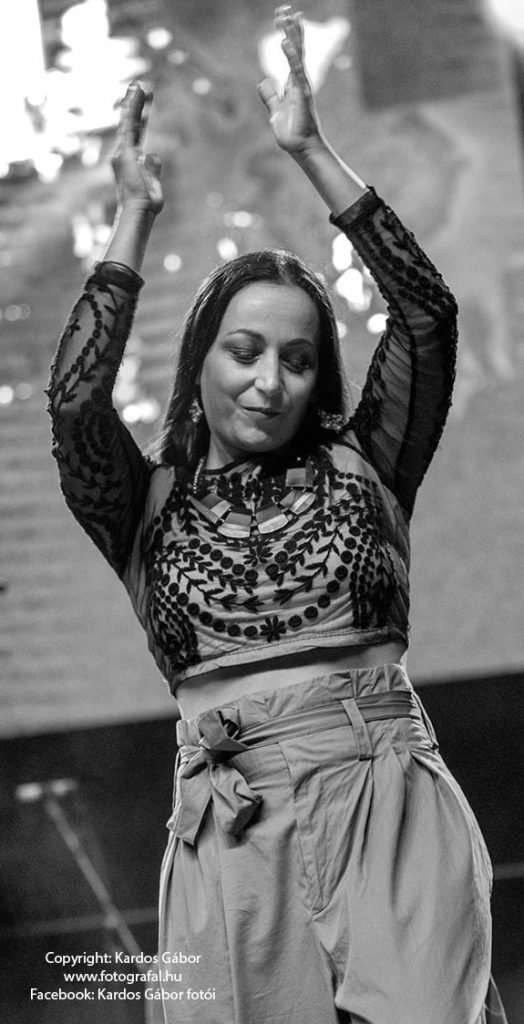
-Years ago, perhaps in 2013, we were standing around in Eger before the concert began. A couple of dancers talked excitedly. The topic was a relatively new TV quiz: The ‘Fölszàllott a páva’. Since then, you have won the solo and doubles category of the well-known and popular competition in 2014 with Kristof. How has this changed your life?
-After Páva, events in our professional lives have spiked. We have been approached by many families who have watched us on television and were sympathetic to our youthful momentum and the work we do in the Angyalföld Vadrózsa and in our resupply groups. We can thank many young talents for the show. In the narrow professional circles, after the Peacock, the real professional success began, because after 2014 we started to expand and find new paths and not only as dancers but also choreographers we started to find new ways.
-You have been around the show ever since as a mentor. What advice would you give to yourself back then?
-I don’t really know what I could suggest, since our mentors Szűcs Gábor and Vajai Franciska gave the best of their knowledge. They set an excellent example.
-Your dancing self is closely linked to teaching. What do you think is more valuable: to lead a group where everyone is extremely talented or where a sense of community drives and engages young dancers?
-For both my husband and I, the goal is clearly community building, all within professional borders. For two years, we have used the term ‘Vadrózsa Család’ (‘Wild Rose Family’) as a brand name, the best expression of our community. Under the wings of the Angyalföldi Vadrózsa Táncegyesület, everyone from half-a-year-olds to seniors will find opportunities tailored to their age. Returning to your question, it is very important for us that our dancers see the Wild Rose and the folk dance as a retaining force, an invisible safety net for us, which is there in the good days but also invisibly protects our souls in the bad periods.
-Budapest is experiencing a renaissance of the folk dance and Hungarian Dance-House movement. Do you go to a Dance-House or do you vent the steam elsewhere?
-We rarely go to a traditional dance-house. To relax, we go to the theater, where we prefer to watch contemporary dance. We also enjoy contemporary dance in the summer time.
-You teach regularly in Canada. Where are you next going, for how long, and what exactly are you doing there?
-In January we visit the cities of Vancouver and Winnipeg where we make choreographies for local Hungarian bands.
– Apart from folk dance, what do you hold dear to your heart, what are you especially interested in dance?
-The aforementioned contemporary dance is very close to my heart. Pál Frenák is my favorite Hungarian creator, from abroad: Akhram Khan, who is of folk backgrounds and Tijmur Dance Theater in Taiwan are my favorites.
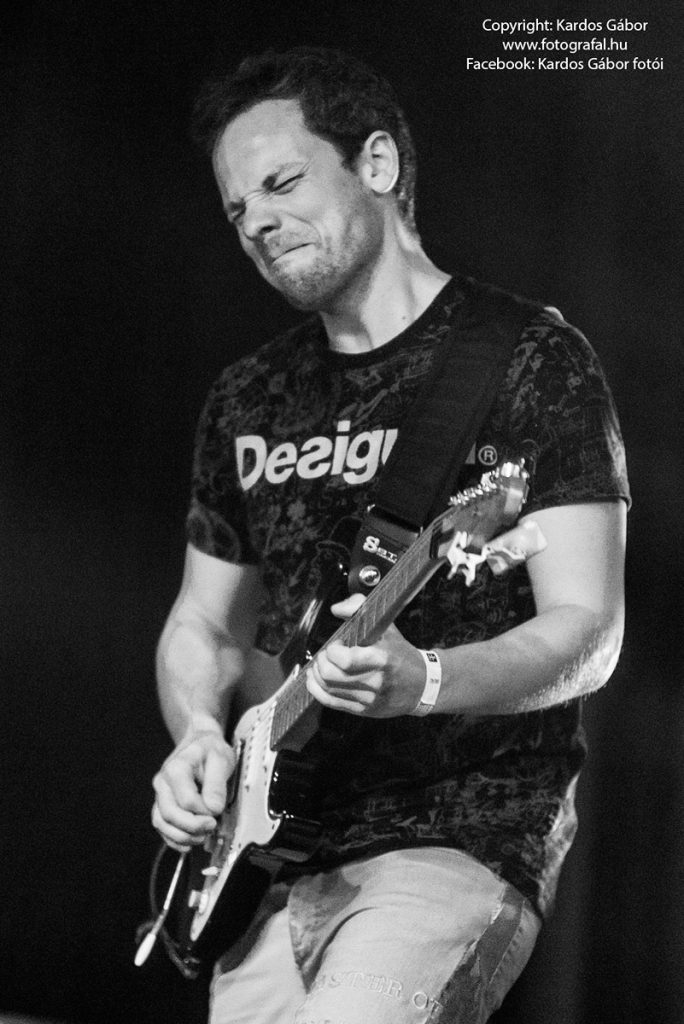
First I heard you play in a theatrical show many years ago, and then you were suddenly here with Besh o droM. How did you get into theater, what companies have you worked with, or still work with today?
-Really? But my theatrical work was never very special. I appeared in one or two pieces, one of my favorites being Maladype Theater’s ‘Tojáséj’ (‘Egg Night’). we performed with the Azuma Clan band as a guests and it was mostly based on an improvisation – a dangerous terrain, but it worked very well.
-You are a regular participant in big productions, “you’re in the arena”. Who have you played with in the past few years?
– People besides Besh whom I’m working and have worked with: Caramel, Andrea Malek, Eszter Bíró, Mariann Falusi, Szilvia Bognár, Edina Mókus Szirtes, Mónika Veres, Solaris, János Bródy, Barna Pély, Pierrot, Nikola Parov and Ágnes Herczku, Anselmo Crew, UP !, A Kiss Erzsi Zene, Azuma Clan.
In addition to performing and studio work, one of my favorite jobs was Péter Vácz’s animated short film ” Nyuszi és Őz/ Rabbit and Deer”, which I was a composer and sound designer for. I really enjoyed the teamwork and the movie ended up travelling the world and bringing 120 awards back from international festivals.
– What do you find most exciting at big concerts?
– Small and big concerts can be equally inspiring. Let’s say at a concert in a sports hall, I like seeing a very complex infrastructure in operation and of course, you feel connected to lots of people at the same time. In a small club, smaller circles, it’s just the simplicity, immediacy, and intimacy that can be the same type of experience.
-You play in several bands at the same time. I’ve never seen you play from sheet music in Besh o droM. How many repertoires can you keep in mind?
-Ooh, but I used to use sheet music even in Besh at the beginning, until I left them at home once and it turned out that they were no longer needed … I usually try to avoid the score, but in many situations I have to. Quite a lot of shows can be kept in mind by the way, and it isn’t even primarily a matter of brain capacity, more depends on the routine.
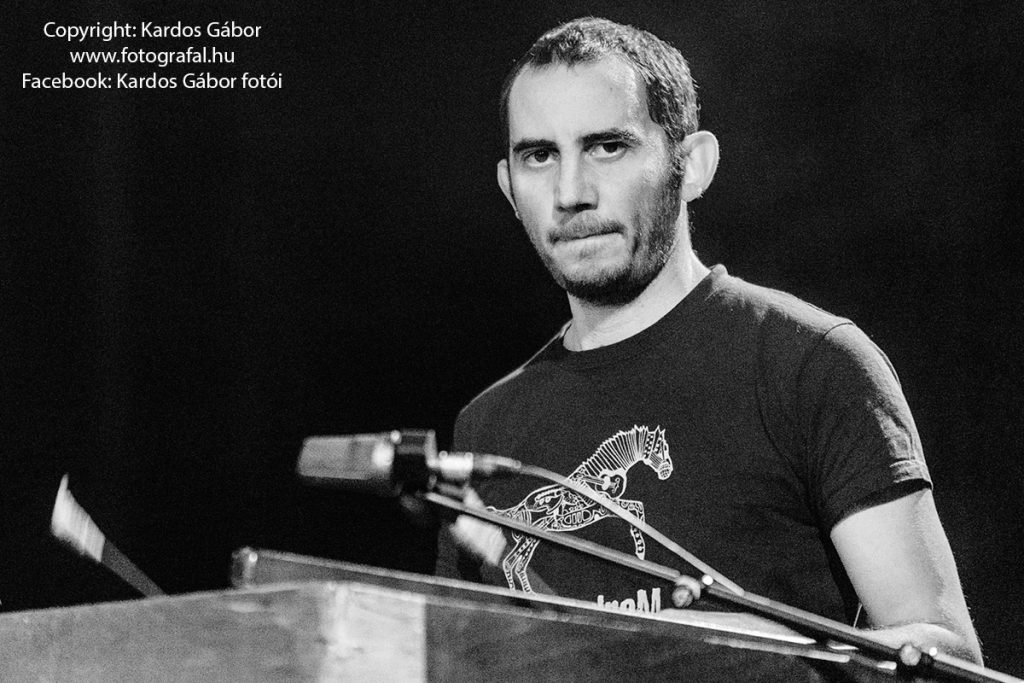
You’re originally from Transylvania, at what age did you move to Hungary?
-I was born in Marosvásárhely and was 18 when we moved to Hungary.
– You went to music school. I guess you didn’t really learn about either Romanian or Hungarian folk music, so how and why are you connected to this world? How much did your father inspire you to be a musician? How available was the cimbalom to you?
-I learned Hungarian and Romanian folk music from my dad before I got any music training. From the age of 8, I have been participating in the Marosvásárhely Folk Ensemble concerts, where at the age of 10 I was already sometimes a substitute my Dad at concerts in the countryside, when he was playing at weddings… Seeing that there was always a cimbalom set up at home, I always played around with it and started getting serious lessons from my dad at the age of 6.
– You spent your military years in alternative service. Derdák Andris’ Csillaghegyi Banán Club had a lot of cultural variety to offer during its time. What kind of concerts do you remember from there?
-Yes, the Banán Club was a diverse place where I was able to gain insight into an alternative music world I was previously unfamiliar with. I was given plenty of rope in organizing Satöbbi, Háború, Kispál és a Borz, Publo Hunny, Kimnowak, and even jazz concerts like Kaltenecker Trió or the Fusio Quartet.
-When did you start performing? Have you always played the cimbalom?
-I have been playing concerts from the age of 8 and I studied piano and percussion (xylophone, drum, kettle, vibraphone, etc.) besides cymbal.
-You got into the Besh o droM near the beginning. How many cimbalom players were in the city in your generation?
-I don’t know exactly, 3 for sure, but there were a lot of cimbalom players among gypsy musicians in my generation too…
-You graduated from the Academy of Music with a cimbalom diploma. What was your most suprising musical experience in those years?
-Almost everything I learned at the time was a bit surprising because I never thought of cimbalom as a polyphonic instrument before, at least not in terms of playing it at the same time. Eg: J. S. Bach: Chorals or any fugue.
-You play a couple of formations beside Besh o droM. What are they? Where can I hear you?
-I am currently on tour in Baku with Magyar Bori and the Cantores Ecclesiae Brass Band. I also have a concert coming up with the Contempo band, Mihály Borbély and Levente Puskás in Bmc on the 20th of November. I’m also playing on the 29th and the 30th of November, with the Swing á la Django band in the Óbudai Társaskör and in BJC.
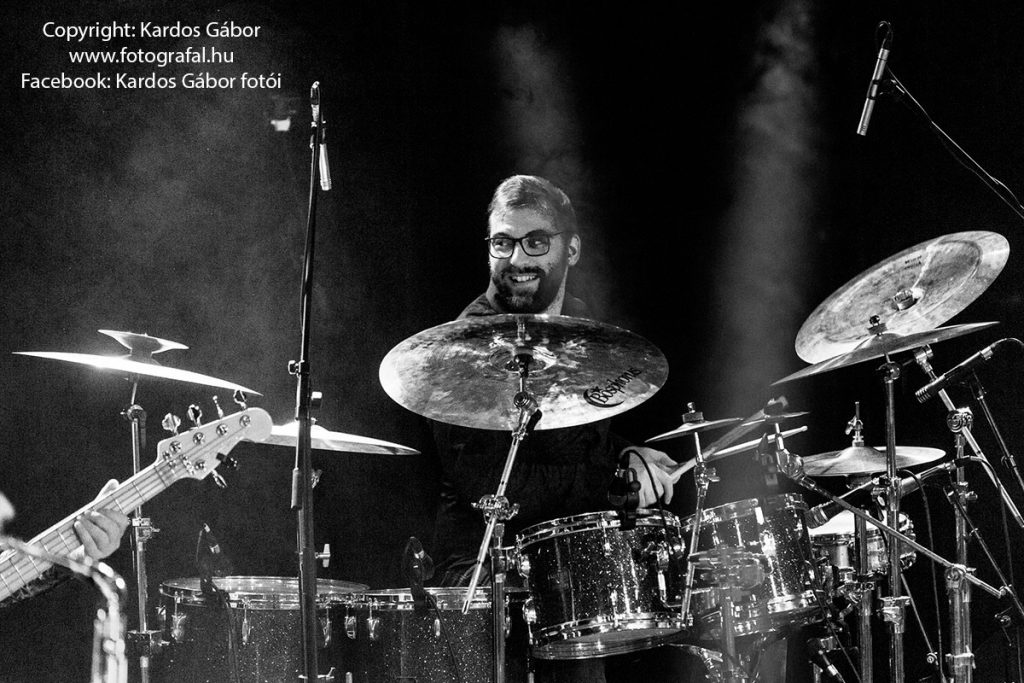
–Are there any musicians in your family other than you?
-Yes, my dad also plays drums on a hobby level and my grandfather plays guitar.
-How did you choose the drum?
-At the age of 4 I was already only interested the drums.
-Now that you already know this and that about the musician’s life, what instrument would you choose if you were just starting out?
– I’d still choose drums! Okay, maybe the bass.
– Despite your tender age, Besh o droM is not the first band you played in. What are the antecedents?
-There were a couple of formations where I was a regular member and I also had/have a lot of session jobs.
-What style of music do you feel most at home with?
-I think probably fusion and groove music.
– Is there a dream band for you where you would love to sit in the drum chair?
-Of course, maybe not a band, but I’d definitely like to play with certain people
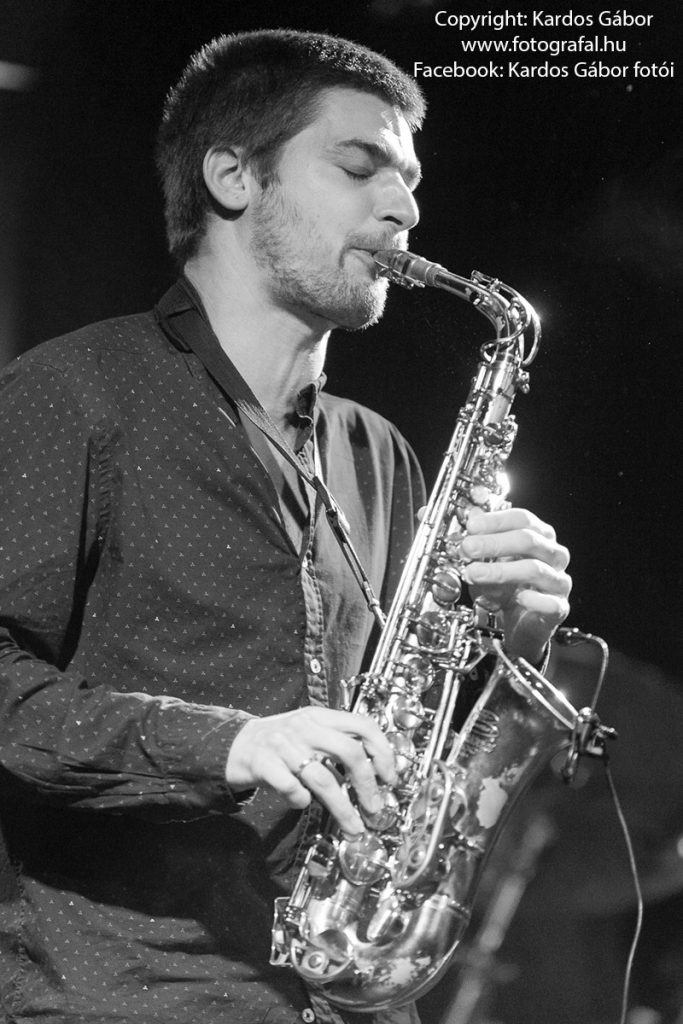
-The first time we met you came from high school for a saxophone lesson. Miki Both recommended that you find Gergő if you’re interested in playing Balkan music on the saxophone. Would you have thought it would turn into this?
– Actually, Miki didn’t recommend Gergő because of Balkan music, I just wanted to play folk, or any other music that wasn’t taught in the school system, so he suggested Gergő immediately. I wouldn’t have thought it would turn into a musical career, nor did I set out to be a musician. All I knew was that from the age of approx. 2-3, music was the only thing that was really able to move my inner world.
-How did you get into Balkan music? Solymár, where you lived at that time, doesn’t typically facilitate this kind of musical world.
-I actually got to know Balkan music from Gergő. Before that I only had experiences with Hungarian folk music.
– After high school, you didn’t continue to study music. What is your civilian profession?
-Yes, I don’t think I could have lasted 5 years for a music teacher diploma, since I didn’t really like jazz or folk music that much, so I was thinking about what would be really useful to learn. I applied for an environmental management agricultural engineer, graduated and now work for a very motivating company. I help farmers directly and indirectly to renew Hungarian soils.
– Do you have any musicians amongst your ancestors?
– My grandfather on my mother’s side was a cantor, but he didn’t teach me anything musical. I think I inherited a love of music from my dad because he sang in the Vasas Choir and had a season ticket to the opera for decades.
-Are your children interested in musical instruments?
-There’s always something around something to hit or blow, but I can’t see the fire in them just yet.
– Do you play in any other bands besides Besh o droM?
-Yes, I still play music actively at Etnorom.
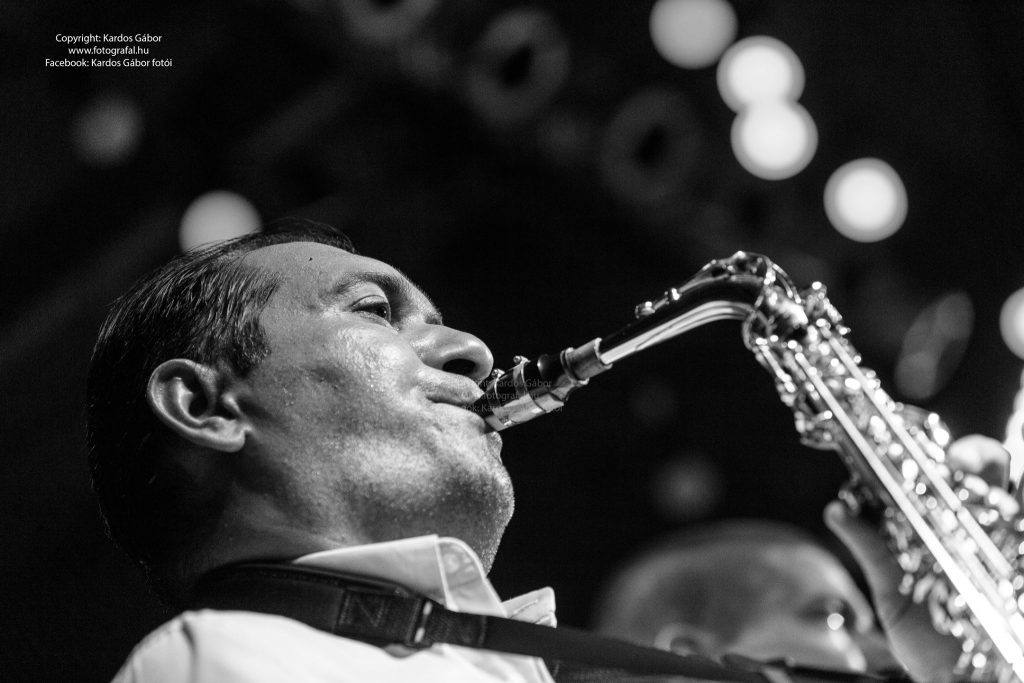
-Are you from a musician family? How old were you when you started playing? Did you choose your instrument?
– I come from a family of musicians, my dad, my grandfather, my uncles were all musicians. I wanted to be a clarinet player because of my father, he was respected by everyone in the city, I wanted to be just like him!
– You have strong ties with the Rajkó band. At what age was this part of your everyday life? What is it from this period that you enjoy looking back at? If you had to sum it up in a few sentences, what is it like to be one of the “Rajkós”?
-At the age of 8 I started to play the flute, then I studied clarinet. I have strong ties with the Rajkós because I learned a lot there: improvisation, sheet music reading, orchestral practice. I learned through participation, the chord movements, bass parts, and what my job is as a clarinet player in a gypsy band! As in, you have to know what you can and what you have to do inside a band on the clarinet. I was in the Rajkó band from the age of 11 until the age of 24. First as a student and later as a professional. I loved being a Rajkó! They were the most beautiful years of my youth. I have negative memories, of course, but let’s just leave it at that.
-How much did restaurant music change and when did this change begin?
-Around 1990 there was a big change in restaurants when the Soviet Union fell. Many restaurants have sent away talented Gypsy musicians, each better than the last. Sadly, many had to look for another job. Those who stayed in the profession, mostly went abroad, or onto ships, etc.
– Recently there has been an effort to bring this kind of hungaricum back, at least into tourism. Is there a place you like to sit in Budapest for the music now?
-2 years ago, the Hungarian gypsy musician community was given the opportunity to bring live music back to the restaurants, so far it has been successful. I hope this continues! There are many restaurants I like to go to, but I like it best where there is gypsy music.
-Your wife also learned some music, and your children continue down the path. On what instruments do they play and learn? Do you think it is worthwhile for a growing child to think about a music career today?
-My wife also learned to play the violin, which she unfortunately stopped later. My older daughter is learning on the flute in the Leo Weiner Conservatory, my younger daughter is playing violin in private. My son learns to play the clarinet, but he also loves percussion instruments. If they are serious about learning instruments, I hope they can make a living out of it later… unfortunately, there’s no way of knowing yet.
-You play in many formations. Where can I hear you besides Besh o droM?
-Besides Besh o droM I play with Swing á la django, Rajkó band, Etnorom, Somnakaj (Hungary’s first gypsy musical), Tint Íz Band, Olah Gipsy Beats, and many Hungarian gypsy restaurant formations.
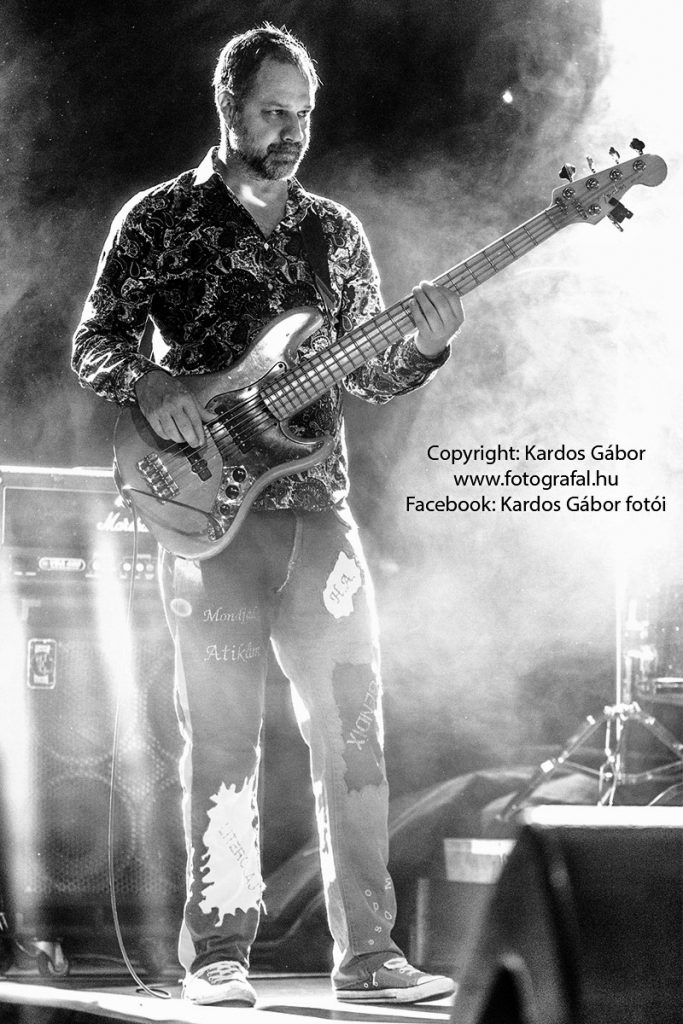
-I think Szentendre is a determining place in your life. What are the advantages and disadvantages of becoming a musician in such an environment? I mean, Szentendre, a city close to Budapest, rich in culture. Does such a place act as a cultural bubble, or is it open to new ideas? Do you get more or less opportunities that almost everyone knows everyone?
-Szentendre is really a very determining place in my life! It was absolutely great to start playing music there and the company was very accepting. Even then, I already played in several bands, which helped me a lot. We had gig opportunities, it was ideal in every way. I grew up in a small town, but due to the proximity of the capital, I didn’t feel isolated from the so-called Budapest reality. That was very fun. At the same time, it was a disadvantage. Within Szentendre, I was in a prominent position as a bass player, and when I started playing in Budapest with the musicians there, I was surprised to find that the level was a little higher than what I was used to at home. But overall Szentedre was definitely an ideal starting point!
-What band did you first play in? When did you decide you wanted to be a professional musician?
-First I worked with bands who mainly reworked the songs of others, and then ones where we might have played our own music. Hard rock, rock, blues, soul, these are the genres that I tried. I think, in retrospect, it was at the very beginning that I decided to become a professional musician. I didn’t start playing music when I was a kid, I was not raised to be a musician at all, it was just a treasure that I found for myself at the age of 14, that I could use to break out of where I was then. Somehow it was clear that I wanted to do this. I went to music school, where my teachers told me it was worth trying college. Then it went on, and there was no return.
-You play in multiple formations besides Besh o droM. What are they and why are each of them dear to you?
-Besides Besh o droM, I actually play in several bands. I’m one of those lucky ones who can say that they are all good and interesting bands, good to play with. Of course, there are different genres, so I can put myself in each of them in different ways. For example, I play with Shirley Williams International Band, who is an American gospell, blues singer. I enjoy playing a classic rock, blues lineup like that. I’m in the world music band Veronaki, which actually plays for kids in a grown-up way, with wonderful songs of their own. Lőrinc Barabás, he can be categorised as jazz, a completely different, instrumental story. I also play in a cumbia band, Los Orangutanes, which is a South American group, with dancers. There is also the Tóth-Eichinger Quartet, which is jazz, but completely different from Lőrinc’s jazz, I love that too. I substitute a lot too. I even got into Besh o droM that way. For me, substitution is the best challange! Joining a team suddenly, learning their music, getting ready for it, getting along, maybe God forbid really substituting a member, not just professionally but also in presence, is a very big challenge for me all the time and I like to do well. It feels good when they are happy with my performance. There are bands where I am a basically a permanent or a number one substitute. Ripof Razkolnikov for example, but there are others.